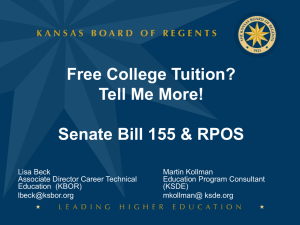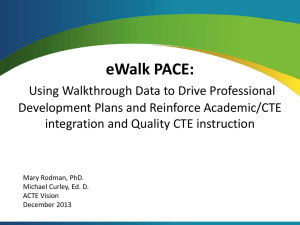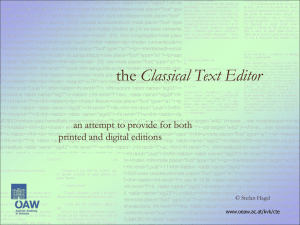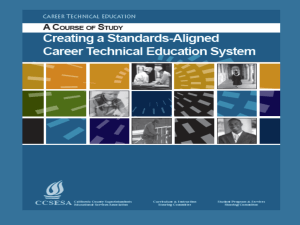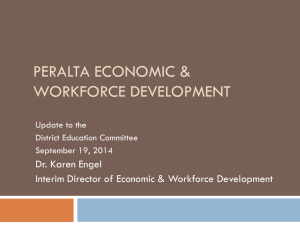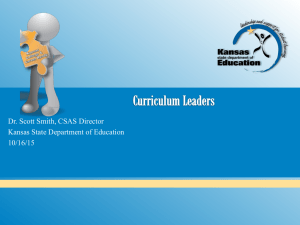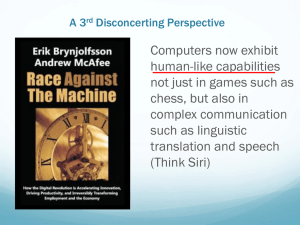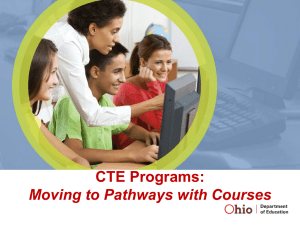Senate Bill 155 & 21st Century Skills in Kansas
advertisement
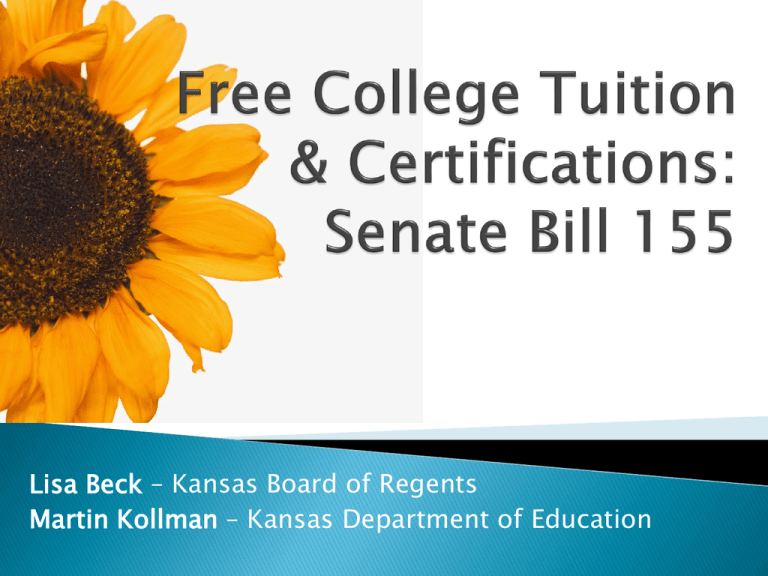
Lisa Beck – Kansas Board of Regents Martin Kollman – Kansas Department of Education 2.9 million residents 450,000 students in public schools (approx.) 69,675 - 11th & 12th grade students (approx.) 286 public school districts 177 private-accredited districts 19 community colleges 7 universities Kansas’ secondary Career & Technical Education (CTE) Division has adopted the National Career Clusters model of 16 career clusters and has currently developed 31 pathways within these clusters. In 2014-15 we will expand the Ag cluster from 3 to 8 pathways to have 36 available to school districts. Participant students must have 1 credit, while Concentrators much have 3 credits. Agriculture – 361 Architecture & Construction – 301 Arts, AV, Comm. – 241 Business Management – 94 Education & Training – 65 Finance – 179 Govt. & Public Admin. – 10 Health Science - 62 Hospitality & Tourism – 97 Human Services - 333 Information Tech. – 208 Law, Public Safety – 15 Manufacturing – 102 Marketing - 88 STEM – 92 Transportation - 50 2013-14: 16 Clusters - 31 Pathways Total in KS – 2298 CTE is identified under rigor, but can be linked to many other components. CTE includes: ◦ ◦ ◦ ◦ ◦ ◦ ◦ ◦ Integration of CTE and Academics Partnerships Career Awareness and Guidance Support and Recognition Innovation Long Term Planning Instructional Practice Professional Learning Key Components of SB 155 Student Tuition Support ($8.75 million) ◦ Tuition paid for all KBOR approved CTE courses School Transportation Costs ($500,000) Incentives to High Schools for Certificates Earned in Key Occupations ($1.5 million) ◦ $1,000 for graduates with credentials Funding for Marketing/Outreach ($50,000) Senate Bill 155 Improve education by increasing the percentage of students who are career and college ready upon high school graduation Improve CTE with additional funding Result = SB 155 Promote SB155 Opportunities Inform & Change Image of CTE Targeted Groups: General Public Parents Students Academic Teachers Counselors Administration Make Materials & Information Available Posters Videos Tri-fold Brochure (also in Spanish) TV and Theatre Spots Social Media FAQs Fact Sheet Order Form Sparks Will Fly - Welder Climbing the Corporate Ladder - Lineman Break the Mold - Nurse Paid to Play – Game Developer Promote your programs locally… ◦ ◦ ◦ ◦ ◦ Who to promote to… ◦ ◦ ◦ ◦ Pathways offered Number of students Careers available Earnings in region and state Training & education needed Local newspapers Area businesses Parents Middle school students Collaborate with… ◦ Businesses & advisory committee ◦ Post-secondary institutions ◦ Workforce & county agencies SB 155 Student Tuition Tuition paid for any Kansas high school student taking KBOR approved CTE courses Students may be charged for fees and books but not tuition Must be Postsecondary Tiered Technical Courses Students more likely to stay in secondary Students more likely to transition to postsecondary after 3 visits to campus Transcripted credit follows students to any college rather than articulated to specific college High schools and colleges collaborate more often and at a higher level – PARTNERSHIPS KEY Parents are more accepting of CTE with college credit being earned Dual enrollment/Concurrent Credit is the norm Pass entrance criteria Must meet academic requirements Generally junior and senior level students Public and private secondary students eligible Can enroll in all available programs Post-secondary reports student participation to KBOR Students can take CTE courses college or dual credit. Courses offered by college faculty or postsecondary approved high school teachers Courses can be offered at the Kansas high school, college, or distance education Can be during normal school hours, after school, or summer break Public school transportation during school hours is covered using mileage formula Amount varies depending on vehicle used from school fleet No special insurance or coverage outside of normal contract for school transportation Block schedules tend to be favored for student participation during school hours Outside school hours is the student’s responsibility Headcount 8,446 9,000 8,000 5,800 7,000 6,000 5,000 3,870 3,475 4,000 3,000 2,000 1,000 0 2011 2012 2013 2014* College Credit Hours 64,968 70,000 60,000 43,312 50,000 40,000 28,000 28,161 30,000 20,000 10,000 0 2011 2012 2013 2014* 23,750,000* 25,000,000 20,000,000 15,000,000 10,000,000 5,000,000 0 11,750,000 15,000,000* Supplemental Appropriation 3,000,000 8,750,000 8,750,000 FY 2013 FY 2014 *Projected Need 19 SB155 Credentials High Wage, High Demand Occupations determined by KDOL Wage is 200% above KS poverty (approximately $34,000 or more) List of Qualifying Credentials (31) for $1,000 High School Incentive http://www.kansasregents.org/governors _cte_initiative Agriculture Construction Machining Welding Health Automotive Computer Support Energy *Reviewed & Revised Annually by Labor, KSDE, & KBOR Student earns Credential by December following Graduation Credential Completion Form Submitted in June to KSDE (after graduation) Once confirmed by KSDE, KBOR sends the $1,000 to the student’s High School 711 Certifications Earned 2012-13 ($711,000 Total) Health - 81% (CNA) Manufacturing - 8% (AWS CW) Construction – 7% (NCCER) Automotive – 3% (ASET) Other – 1% (CDL) 694 by Public Students (108 Districts) 17 by Private Students KANSASWORKS.com/careerzoom kansasregents.org/governors_cte_initiative ksde.org > CTE > CTE Newsletters > SB 155 Reference Materials Lisa Beck Associate Director Career Technical Education Kansas Board of Regents lbeck@ksbor.org Martin Kollman Education Program Consultant/ RPOS Coordinator / Perkins Consultant Kansas State Department of Education mkollman@ksde.org
